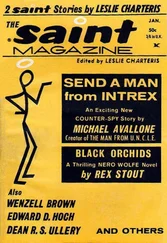E. Werner - Saint Michael
Здесь есть возможность читать онлайн «E. Werner - Saint Michael» — ознакомительный отрывок электронной книги совершенно бесплатно, а после прочтения отрывка купить полную версию. В некоторых случаях можно слушать аудио, скачать через торрент в формате fb2 и присутствует краткое содержание. Жанр: foreign_prose, foreign_antique, на английском языке. Описание произведения, (предисловие) а так же отзывы посетителей доступны на портале библиотеки ЛибКат.
- Название:Saint Michael
- Автор:
- Жанр:
- Год:неизвестен
- ISBN:нет данных
- Рейтинг книги:3 / 5. Голосов: 1
-
Избранное:Добавить в избранное
- Отзывы:
-
Ваша оценка:
- 60
- 1
- 2
- 3
- 4
- 5
Saint Michael: краткое содержание, описание и аннотация
Предлагаем к чтению аннотацию, описание, краткое содержание или предисловие (зависит от того, что написал сам автор книги «Saint Michael»). Если вы не нашли необходимую информацию о книге — напишите в комментариях, мы постараемся отыскать её.
Saint Michael — читать онлайн ознакомительный отрывок
Ниже представлен текст книги, разбитый по страницам. Система сохранения места последней прочитанной страницы, позволяет с удобством читать онлайн бесплатно книгу «Saint Michael», без необходимости каждый раз заново искать на чём Вы остановились. Поставьте закладку, и сможете в любой момент перейти на страницу, на которой закончили чтение.
Интервал:
Закладка:
Handsome, Michael Rodenberg certainly was not,–in that respect he was far behind Hans Wehlau,–but he was one who could never pass unnoticed. His tall, muscular figure seemed created to wear a uniform and to gird on a sword. It had exchanged all the awkwardness of the boy for the erect carriage of the soldier. His fair, close curls had lost none of their luxuriance, but they were carefully arranged, and the bearded face, if it could lay no claim to beauty, was interesting enough without it. All that was boyish in it had vanished, the strong, resolute head was that of ripe manhood,–a manhood too early ripened, perchance, for the countenance expressed at times a degree of gravity which was almost sternness, and which does not belong to youth.
In the eyes, too, there was none of the old dreamy look; their gaze had grown keen and firm, but they never had learned to sparkle with the joyous inspiration of youth. There was something chilling in them, as indeed in the whole air of the young man, which only at intervals, in conversation, was animated by a genial glow. Yet, as he stood there, erect, firm, resolute, he was the ideal of a soldier from head to heel.
"In uniform?" asked the Professor, surprised, as Michael bade him good-morning. "Have you an official visit to pay here?"
"After a fashion, yes; I must go over to Elmsdorf. The former chief of my regiment, Colonel von Reval, since he resigned, has always spent the summer and autumn at his country-seat there. He probably thinks that I have been here some time, for I found upon my arrival yesterday a few lines from him inviting me to Elmsdorf. My aunt will, I hope, excuse me; the colonel has been very kind to me."
"You were always his special favourite," Hans remarked. "When he returned at the close of the Danish war, he came to see papa to congratulate him upon having so distinguished a son. I was furious at the time, for as I had heard nothing for weeks except songs of praise in your honour, with animadversions upon my insignificance, your doughty deeds were deeply annoying to me."
"Most certainly no one ever congratulated me upon possessing you , at least during your university course," Wehlau observed, sharply. "Moreover, we expected you here last week; why did you come so late?"
"On Michael's account; he could not get leave until he had accompanied his regiment into quarters after being on special duty. When I went to his quarters to find him, I had a piece of luck–"
"As usual!" the Professor interjected.
"Yes. I had made up my mind to spend a week in that dull provincial town, but on my arrival I heard that Michael was three miles away, in a gay little watering-place, near which his regiment was exercising. Of course I hurried after him, with a blessing upon the wisdom of the military authorities. The Herr Lieutenant was indeed head over ears in strict attention to duty, and quite deaf and blind to all else, even to an acquaintance for which every other officer of his corps envied him, and of which he would not take the least advantage. No one else could gain admission at Countess Steinrück's; she was very much of an invalid."
The Professor was evidently struck by the name, and cast a keen glance at Michael. "Countess Steinrück?"
"Of Berkheim. You know her, papa; for, as she herself told me, you were often at her father-in-law's when you were a young physician, and at her request you went to her when her husband was dying. She is very grateful yet to you for doing so."
"Of course I know her; but how did you make her acquaintance, Michael?"
"By accident," was the laconic reply.
"It was certainly by no fault of his," Hans said, in a mocking tone that plainly betrayed his ignorance of the part played in Michael's life by the name of Steinrück. "I must tell you the story in detail, papa; it begins very romantically. Well, Michael was sitting in the forest,–that is, he was in command of his men there and ordering them to fire,–when a carriage came driving along a road in the distance. The horses were frightened by the firing and ran away; the coachman lost his reins, and the danger was imminent, when from the dim forest near by a gallant knight rushed to the rescue, stopped the horses, tore open the carriage door, and lifted out the fainting ladies–"
"Stick to the truth, Hans," the young officer interposed, with some irritation. "Neither the danger nor the heroism was as great as you describe. I merely saw that the horses were frightened, and ran up to avert an accident; but the brutes stopped as soon as I caught hold of their bridles, and the ladies sat still in the carriage. No need of any poetical exaggeration."
"Nor of such prosaic treatment of facts," Hans retorted. "I heard the story from the Countess herself, and she persists quite as obstinately in saying that you saved her life as you persist in denying having done so."
Michael shrugged his shoulders and turned to the Professor. "In fact, the Countess did thus persist, and as the house where I was staying was near her villa I could not avoid frequent meetings with her. But I was very much occupied with the service, and had but little time at my disposal."
"Yes, yes, that eternal 'service'!" exclaimed Hans, indignantly. "At last he was never to be seen. It was with the greatest difficulty that I persuaded him to find time to introduce me, and when he had done so he went off, and left me to explain and apologize for his extraordinary behaviour. The ladies made him the most amiable advances, but he was a perfect icicle."
"Michael probably has his own reasons for his conduct," said Wehlau; "and if he thought best to maintain a degree of reserve, you would have done well to follow his example."
"Ah, no; that was simply out of the question. The young Countess was too beautiful,–a perfect princess in a fairy-tale: superb golden hair and eyes that shine like stars. They can beguile, those eyes of hers."
"And can scorn," Michael added, in a tone the coldness of which contrasted strongly with his friend's enthusiasm. "Beware of them, Hans; it is a sad fate to be first beguiled and then scorned."
"You say that because the Countess Hertha is thought very haughty. I too believe that any man who could not reckon up ten generations of ancestors at least would have but a poor chance if he were audacious enough to woo her. Since, however, I do not covet that honour, nothing hinders my admiration. And if I should really allow myself to be beguiled by those eyes–"
"Come, come; let all that alone," his father cut short his son's sentence. "You have no business with fairy princesses or starry eyes; I bar all such nonsense. All that you have to think about is your coming thesis."
The two young men exchanged a hasty, significant glance, and Michael said, lightly, "Do not be troubled, uncle. If Hans is a little scorched, it will do him no harm; he is used to it."
"Yes, he has been childish and silly enough, but now he will have the kindness to adopt a graver tone. I have an unoccupied morning to-day, Hans, and we will have an exhaustive talk about your studies. The sketch of them that you gave me in the holidays was very slight. I want now to know all about them."
Again the young men exchanged a glance that seemed to betoken a secret understanding, as the Professor arose and said, casually, "I only want to tell Leni that she must be careful to-day about sending my letters to the post. I shall be back immediately," with which he left the room.
Hans looked after him, folded his arms, and said, in an undertone, "Now for the bursting of the bomb!"
"Do not take the matter so easily," Michael admonished him. "You certainly have a hard battle to fight; my uncle will be furious."
"I know it; that's why I am all armed and equipped. You're not going; I can't spare you. When the fight grows too hot I shall summon you as my corps de réserve . Do stay and help me."
Читать дальшеИнтервал:
Закладка:
Похожие книги на «Saint Michael»
Представляем Вашему вниманию похожие книги на «Saint Michael» списком для выбора. Мы отобрали схожую по названию и смыслу литературу в надежде предоставить читателям больше вариантов отыскать новые, интересные, ещё непрочитанные произведения.
Обсуждение, отзывы о книге «Saint Michael» и просто собственные мнения читателей. Оставьте ваши комментарии, напишите, что Вы думаете о произведении, его смысле или главных героях. Укажите что конкретно понравилось, а что нет, и почему Вы так считаете.












